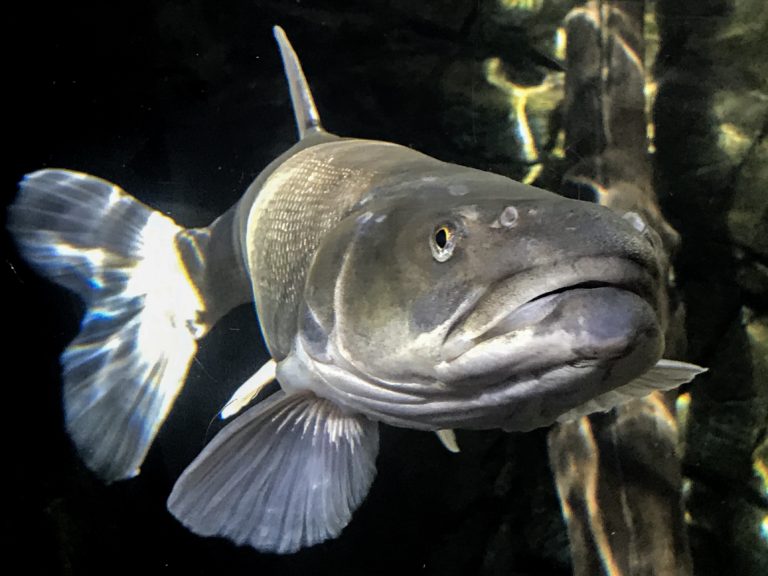
Project Threatens Endangered Species, River Flows, Climate
Conservation groups today issued a notice of intent to sue the Trump administration for approving rights-of-way for pipelines and powerlines that pave the way for the nation’s first commercial oil shale development. The massive Enefit project in Utah’s Uintah Basin would drain billions of gallons of water from the Green River, threaten endangered species and generate enormous amounts of greenhouse gas pollution.
Oil shale is one of the world’s most carbon-intensive fuels whose strip mining can require several barrels of water for each barrel of oil, or kerogen, produced. At full buildout, Enefit’s facility would produce 50,000 barrels per day of oil from the Green River Formation.
“This project would be a disaster for the climate, the Colorado River and endangered species,” said Taylor McKinnon, a senior campaigner at the Center for Biological Diversity. “Draining rivers to mine high-carbon fossil fuels will accelerate climate change that’s already drying the Colorado River Basin. The West needs to chart a sustainable future, but the Trump administration is paving the road to catastrophe.”
Today’s notice says the Bureau of Land Management and U.S. Fish and Wildlife Service failed to protect several endangered species when they approved electricity, oil, gas and water lines across public lands. The notice argues that federal agencies violated the law by ignoring the potential harm to imperiled fish, studying only the harm from water depletions necessary to build the pipeline, not to operate it.
“The BLM approved the rights-of-way to service the oil-shale development based on an utterly inadequate analysis of its potentially devastating environmental impacts,” said Michael Toll, a staff attorney at the Grand Canyon Trust. “Considering the rights-of-way are a public subsidy of an otherwise economically unfeasible oil-shale facility, the public has a right to know exactly how Enefit’s project will impact the environment.”
The water pipeline will allow the Estonia-owned Enefit American Oil to drain more than 10,000 acre feet annually from the Green River, harming critical habitat for endangered fish, including the Colorado pikeminnow and the razorback sucker. Mining the oil shale will destroy habitat for two rare wildflower species for which Endangered Species Act protections are proposed. The project comes as western states struggle with record droughts and climate-driven declines in river flows in the Colorado River Basin.
“The water resources of the Colorado River Basin are already headed toward irretrievable decline in both quantity and quality,” said John Weisheit with Living Rivers Colorado Riverkeeper. “Opposing the Enefit Project is a no brainer; it epitomizes exactly what inappropriate development looks like.”
Enefit intends to strip-mine about 28 million tons of rock a year over thousands of acres of high-desert habitat. It will also construct a major production facility to bake the rock at high temperatures. The half-square-mile processing plant, about 45 miles south of Dinosaur National Monument, will turn pre-petroleum stones into refinery-ready oil.
“There are very levelheaded reasons why the United States hasn’t invested in commercial oil shale extraction before – and this project, in particular, would be uniquely destructive in Utah,” said Alex Hardee, an attorney at Earthjustice. “The Fish and Wildlife Service has a duty to ensure that federal approvals do not drive endangered species off the cliff of extinction. But the agency turned a blind eye to the devastating effects this oil shale project would inflict by only paying attention to the water it would suck up to build this nonsensical pipeline but not to actually operate it.”
“Every resident of the state should be alarmed. This oil shale project would exploit, degrade, and exhaust Utah’s most precious natural resources – our water, our air, and our beautiful natural landscapes,” said Dr. Brian Moench, president of Utah Physicians for a Healthy Environment. “It threatens public health, will tie Utah’s future to dirty energy and will accelerate climate the crisis. Even worse, the only beneficiary of this scheme is a foreign oil company.”
The project would produce 547 million barrels of oil over three decades, spewing more than 200 million tons of greenhouse gas — as much as 50 coal-fired power plants produce in a year. Those emissions would contribute to global warming and regional drought already afflicting the rivers and their endangered fish.
“BLM is essentially telling the public not to worry because the pipes and power lines themselves won’t have much impact, while turning a blind eye to the large-scale destruction that this infrastructure will enable,” said Ann Alexander, senior attorney with Natural Resources Defense Council.
“Everything related to this project represents a worst case scenario for this severely climate change impacted region and the planet,” said Dan Mayhew, conservation chair of the Utah Chapter of the Sierra Club. “Rampant destruction of public lands and large scale water dependency while adding pollution to an already challenged airshed. This project needs to be stopped in its tracks now.”
The 60-day notice gives the agencies an opportunity to comply with the Endangered Species Act and avoid a lawsuit.
“The Colorado River is disappearing due to mismanagement, drought and accelerating climate change, putting at risk not only multiple endangered species but also the drinking water for nearly 40 million people,” said Daniel E. Estrin, advocacy director at Waterkeeper Alliance. “In the face of this crisis, FWS and BLM’s approvals could cause 100 billion gallons of water to be removed from the basin over the next three decades, harming government-protected endangered species and hastening the collapse of a critical water supply system already teetering on the brink of failure.”
The groups filing today’s notice are the Center for Biological Diversity, Grand Canyon Trust, Living Rivers/Colorado Riverkeeper, Natural Resources Defense Council, Sierra Club, Utah Physicians for a Healthy Environment and Waterkeeper Alliance. The groups are represented by attorneys from Earthjustice, Grand Canyon Trust and the Center for Biological Diversity.
**Photo courtesy of Center for Biological Diversity